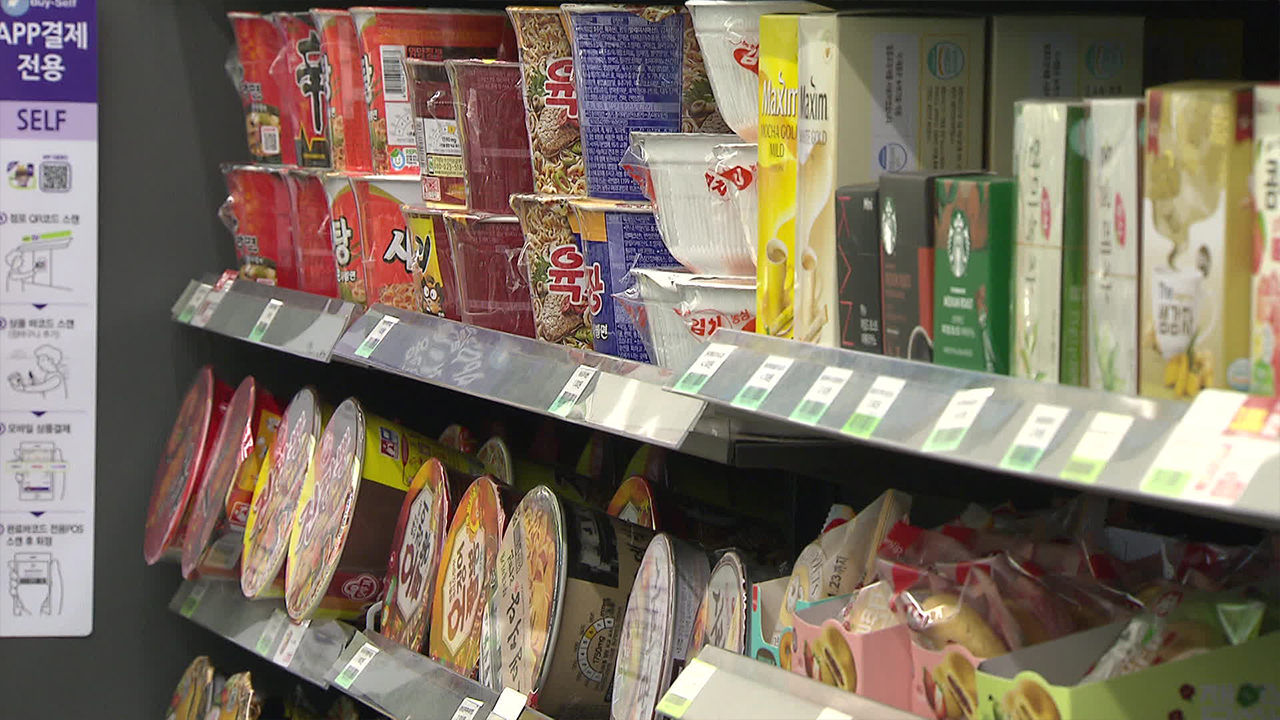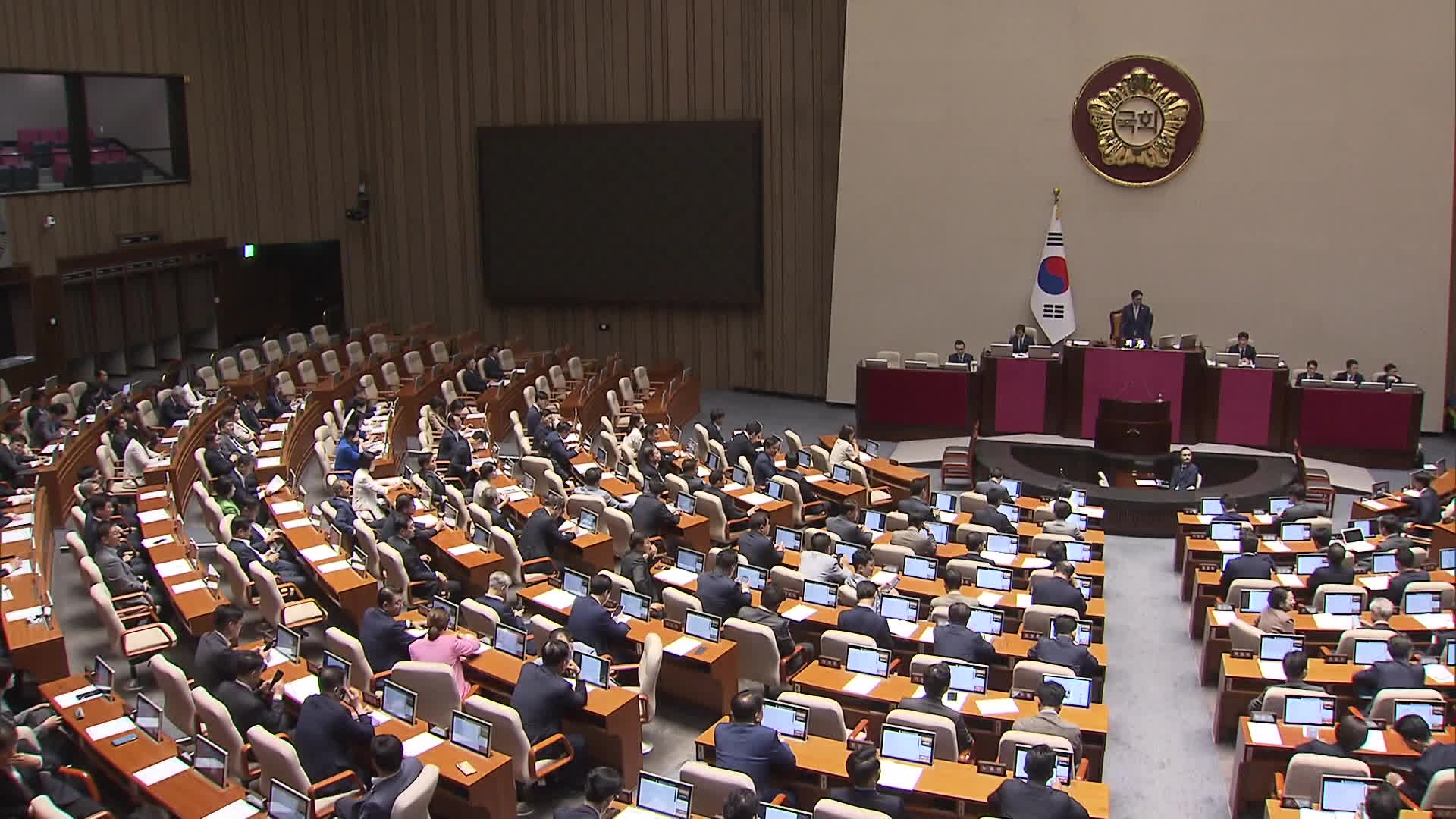Convenientce stores demand payment for new product displays, suppliers face multiple costs
입력 2024.10.15 (00:13)
읽어주기 기능은 크롬기반의
브라우저에서만 사용하실 수 있습니다.
[Anchor]
Recently, convenience store sales have increased to the point where they are rivaling department stores, which hold the top position in offline retail sales.
However, companies that supply products to convenience stores are complaining that even though their sales are increasing, not much is left in their hands.
What is going on? Reporter Kim Jin-hee has investigated.
[Report]
Convenience stores sell an average of about 3,000 items.
As such, competition to attract consumer choice is fierce.
Some bear the costs of marketing promotions like 'Buy 2, Get 1 Free', and others pay various incentives.
Some suppliers have had to pay 'display incentives' to showcase their products in visible locations, and to introduce new products, they had to pay 'listing incentives' to the headquarters.
Some suppliers even have paid 'order incentives' or 'performance incentives' to place larger orders.
[Supplier/voice altered: "Of course, it’s burdensome. It’s a structure you can’t avoid. If you don’t offer order incentives, there probably won’t be any orders, right?"]
In fact, one in five suppliers reported that their cost burdens have increased.
[Choo Mun-gap/Head of Economic Policy Division, Korea Federation of Small and Medium Businesses: "Supplying to convenience stores is an unavoidable aspect for companies in terms of finding sales channels. But even if they sell, there’s not much left... This is something we hear often."]
The headquarters of convenience stores explains that the incentives are left to the discretion of the suppliers.
[Convenience Store Headquarters Official/voice altered: "We don’t force them to do it unconditionally. It’s left as an option for the suppliers."]
However, as the Fair Trade Commission began an investigation into allegations of 'abuse of power' in the convenience store industry and is reviewing whether to impose sanctions, four convenience store companies have voluntarily proposed corrective measures.
Whether these voluntary corrective measures will be accepted is expected to be decided as early as this year.
This is KBS News, Kim Jin-hee.
Recently, convenience store sales have increased to the point where they are rivaling department stores, which hold the top position in offline retail sales.
However, companies that supply products to convenience stores are complaining that even though their sales are increasing, not much is left in their hands.
What is going on? Reporter Kim Jin-hee has investigated.
[Report]
Convenience stores sell an average of about 3,000 items.
As such, competition to attract consumer choice is fierce.
Some bear the costs of marketing promotions like 'Buy 2, Get 1 Free', and others pay various incentives.
Some suppliers have had to pay 'display incentives' to showcase their products in visible locations, and to introduce new products, they had to pay 'listing incentives' to the headquarters.
Some suppliers even have paid 'order incentives' or 'performance incentives' to place larger orders.
[Supplier/voice altered: "Of course, it’s burdensome. It’s a structure you can’t avoid. If you don’t offer order incentives, there probably won’t be any orders, right?"]
In fact, one in five suppliers reported that their cost burdens have increased.
[Choo Mun-gap/Head of Economic Policy Division, Korea Federation of Small and Medium Businesses: "Supplying to convenience stores is an unavoidable aspect for companies in terms of finding sales channels. But even if they sell, there’s not much left... This is something we hear often."]
The headquarters of convenience stores explains that the incentives are left to the discretion of the suppliers.
[Convenience Store Headquarters Official/voice altered: "We don’t force them to do it unconditionally. It’s left as an option for the suppliers."]
However, as the Fair Trade Commission began an investigation into allegations of 'abuse of power' in the convenience store industry and is reviewing whether to impose sanctions, four convenience store companies have voluntarily proposed corrective measures.
Whether these voluntary corrective measures will be accepted is expected to be decided as early as this year.
This is KBS News, Kim Jin-hee.
■ 제보하기
▷ 카카오톡 : 'KBS제보' 검색, 채널 추가
▷ 전화 : 02-781-1234, 4444
▷ 이메일 : kbs1234@kbs.co.kr
▷ 유튜브, 네이버, 카카오에서도 KBS뉴스를 구독해주세요!
- Convenientce stores demand payment for new product displays, suppliers face multiple costs
-
- 입력 2024-10-15 00:13:02

[Anchor]
Recently, convenience store sales have increased to the point where they are rivaling department stores, which hold the top position in offline retail sales.
However, companies that supply products to convenience stores are complaining that even though their sales are increasing, not much is left in their hands.
What is going on? Reporter Kim Jin-hee has investigated.
[Report]
Convenience stores sell an average of about 3,000 items.
As such, competition to attract consumer choice is fierce.
Some bear the costs of marketing promotions like 'Buy 2, Get 1 Free', and others pay various incentives.
Some suppliers have had to pay 'display incentives' to showcase their products in visible locations, and to introduce new products, they had to pay 'listing incentives' to the headquarters.
Some suppliers even have paid 'order incentives' or 'performance incentives' to place larger orders.
[Supplier/voice altered: "Of course, it’s burdensome. It’s a structure you can’t avoid. If you don’t offer order incentives, there probably won’t be any orders, right?"]
In fact, one in five suppliers reported that their cost burdens have increased.
[Choo Mun-gap/Head of Economic Policy Division, Korea Federation of Small and Medium Businesses: "Supplying to convenience stores is an unavoidable aspect for companies in terms of finding sales channels. But even if they sell, there’s not much left... This is something we hear often."]
The headquarters of convenience stores explains that the incentives are left to the discretion of the suppliers.
[Convenience Store Headquarters Official/voice altered: "We don’t force them to do it unconditionally. It’s left as an option for the suppliers."]
However, as the Fair Trade Commission began an investigation into allegations of 'abuse of power' in the convenience store industry and is reviewing whether to impose sanctions, four convenience store companies have voluntarily proposed corrective measures.
Whether these voluntary corrective measures will be accepted is expected to be decided as early as this year.
This is KBS News, Kim Jin-hee.
Recently, convenience store sales have increased to the point where they are rivaling department stores, which hold the top position in offline retail sales.
However, companies that supply products to convenience stores are complaining that even though their sales are increasing, not much is left in their hands.
What is going on? Reporter Kim Jin-hee has investigated.
[Report]
Convenience stores sell an average of about 3,000 items.
As such, competition to attract consumer choice is fierce.
Some bear the costs of marketing promotions like 'Buy 2, Get 1 Free', and others pay various incentives.
Some suppliers have had to pay 'display incentives' to showcase their products in visible locations, and to introduce new products, they had to pay 'listing incentives' to the headquarters.
Some suppliers even have paid 'order incentives' or 'performance incentives' to place larger orders.
[Supplier/voice altered: "Of course, it’s burdensome. It’s a structure you can’t avoid. If you don’t offer order incentives, there probably won’t be any orders, right?"]
In fact, one in five suppliers reported that their cost burdens have increased.
[Choo Mun-gap/Head of Economic Policy Division, Korea Federation of Small and Medium Businesses: "Supplying to convenience stores is an unavoidable aspect for companies in terms of finding sales channels. But even if they sell, there’s not much left... This is something we hear often."]
The headquarters of convenience stores explains that the incentives are left to the discretion of the suppliers.
[Convenience Store Headquarters Official/voice altered: "We don’t force them to do it unconditionally. It’s left as an option for the suppliers."]
However, as the Fair Trade Commission began an investigation into allegations of 'abuse of power' in the convenience store industry and is reviewing whether to impose sanctions, four convenience store companies have voluntarily proposed corrective measures.
Whether these voluntary corrective measures will be accepted is expected to be decided as early as this year.
This is KBS News, Kim Jin-hee.
-
-

김진희 기자 hydrogen@kbs.co.kr
김진희 기자의 기사 모음
-
이 기사가 좋으셨다면
-
좋아요
0
-
응원해요
0
-
후속 원해요
0










![[속보] 김건희 특검팀, 이응근 전 삼부토건 대표 <br>소환조사](/data/layer/904/2025/07/20250704_TDFd6l.jpg)

![[속보] 내란특검 “윤 변호인 수사방해 의혹, 파견경찰이 자료수집 중”](/data/news/2025/07/04/20250704_zxJ5qZ.jpg)
![[단독] “이 대통령, 주요국에 특사파견 예정…미·일 특사 막판 조율”](/data/layer/904/2025/07/20250704_DNItCk.jpg)

이 기사에 대한 의견을 남겨주세요.